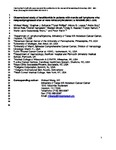Observational study of lenalidomide in patients with mantle cell lymphoma who relapsed/progressed after or were refractory/intolerant to ibrutinib (MCL-004)
| dc.contributor.author | Wang, M | |
| dc.contributor.author | Schuster, SJ | |
| dc.contributor.author | Phillips, T | |
| dc.contributor.author | Lossos, IS | |
| dc.contributor.author | Goy, A | |
| dc.contributor.author | Rule, Simon | |
| dc.contributor.author | Hamadani, M | |
| dc.contributor.author | Ghosh, N | |
| dc.contributor.author | Reeder, CB | |
| dc.contributor.author | Barnett, E | |
| dc.contributor.author | Bravo, M-LC | |
| dc.contributor.author | Martin, P | |
| dc.date.accessioned | 2017-11-15T10:28:02Z | |
| dc.date.available | 2017-11-15T10:28:02Z | |
| dc.date.issued | 2017-12 | |
| dc.identifier.issn | 1756-8722 | |
| dc.identifier.issn | 1756-8722 | |
| dc.identifier.other | 171 | |
| dc.identifier.uri | http://hdl.handle.net/10026.1/10157 | |
| dc.description.abstract |
BACKGROUND: The observational MCL-004 study evaluated outcomes in patients with relapsed/refractory mantle cell lymphoma who received lenalidomide-based therapy after ibrutinib failure or intolerance. METHODS: The primary endpoint was investigator-assessed overall response rate based on the 2007 International Working Group criteria. RESULTS: Of 58 enrolled patients (median age, 71 years; range, 50-89), 13 received lenalidomide monotherapy, 11 lenalidomide plus rituximab, and 34 lenalidomide plus other treatment. Most patients (88%) had received ≥ 3 prior therapies (median 4; range, 1-13). Median time from last dose of ibrutinib to the start of lenalidomide was 1.3 weeks (range, 0.1-21.7); 45% of patients had partial responses or better to prior ibrutinib. Primary reasons for ibrutinib discontinuation were lack of efficacy (88%) and ibrutinib toxicity (9%). After a median of two cycles (range, 0-11) of lenalidomide-based treatment, 17 patients responded (8 complete responses, 9 partial responses), for a 29% overall response rate (95% confidence interval, 18-43%) and a median duration of response of 20 weeks (95% confidence interval, 2.9 to not available). Overall response rate to lenalidomide-based therapy was similar for patients with relapsed/progressive disease after previous response to ibrutinib (i.e., ≥PR) versus ibrutinib-refractory (i.e., ≤SD) patients (30 versus 32%, respectively). The most common all-grade treatment-emergent adverse events after lenalidomide-containing therapy (n = 58) were fatigue (38%) and cough, dizziness, dyspnea, nausea, and peripheral edema (19% each). At data cutoff, 28 patients have died, primarily due to mantle cell lymphoma. CONCLUSION: Lenalidomide-based treatment showed clinical activity, with no unexpected toxicities, in patients with relapsed/refractory mantle cell lymphoma who previously failed ibrutinib therapy. TRIAL REGISTRATION: Clinicaltrials.gov identifier NCT02341781 . Date of registration: January 14, 2015. | |
| dc.format.extent | 171- | |
| dc.format.medium | Electronic | |
| dc.language | en | |
| dc.language.iso | eng | |
| dc.publisher | Springer Science and Business Media LLC | |
| dc.subject | Ibrutinib failure | |
| dc.subject | Lenalidomide | |
| dc.subject | Mantle cell lymphoma | |
| dc.title | Observational study of lenalidomide in patients with mantle cell lymphoma who relapsed/progressed after or were refractory/intolerant to ibrutinib (MCL-004) | |
| dc.type | journal-article | |
| dc.type | Journal Article | |
| plymouth.author-url | https://www.webofscience.com/api/gateway?GWVersion=2&SrcApp=PARTNER_APP&SrcAuth=LinksAMR&KeyUT=WOS:000414255600001&DestLinkType=FullRecord&DestApp=ALL_WOS&UsrCustomerID=11bb513d99f797142bcfeffcc58ea008 | |
| plymouth.issue | 1 | |
| plymouth.volume | 10 | |
| plymouth.publication-status | Published | |
| plymouth.journal | Journal of Hematology & Oncology | |
| dc.identifier.doi | 10.1186/s13045-017-0537-5 | |
| plymouth.organisational-group | /Plymouth | |
| plymouth.organisational-group | /Plymouth/Faculty of Health | |
| plymouth.organisational-group | /Plymouth/Faculty of Health/Peninsula Medical School | |
| plymouth.organisational-group | /Plymouth/REF 2021 Researchers by UoA | |
| plymouth.organisational-group | /Plymouth/REF 2021 Researchers by UoA/UoA01 Clinical Medicine | |
| plymouth.organisational-group | /Plymouth/REF 2021 Researchers by UoA/UoA01 Clinical Medicine/UoA01 Clinical Medicine | |
| plymouth.organisational-group | /Plymouth/Research Groups | |
| plymouth.organisational-group | /Plymouth/Research Groups/Institute of Translational and Stratified Medicine (ITSMED) | |
| plymouth.organisational-group | /Plymouth/Research Groups/Institute of Translational and Stratified Medicine (ITSMED)/CBR | |
| plymouth.organisational-group | /Plymouth/Research Groups/Institute of Translational and Stratified Medicine (ITSMED)/CCT&PS | |
| plymouth.organisational-group | /Plymouth/Users by role | |
| plymouth.organisational-group | /Plymouth/Users by role/Academics | |
| dc.publisher.place | England | |
| dcterms.dateAccepted | 2017-10-17 | |
| dc.identifier.eissn | 1756-8722 | |
| dc.rights.embargoperiod | Not known | |
| rioxxterms.versionofrecord | 10.1186/s13045-017-0537-5 | |
| rioxxterms.licenseref.uri | http://www.rioxx.net/licenses/all-rights-reserved | |
| rioxxterms.licenseref.startdate | 2017-11-02 | |
| rioxxterms.type | Journal Article/Review |


